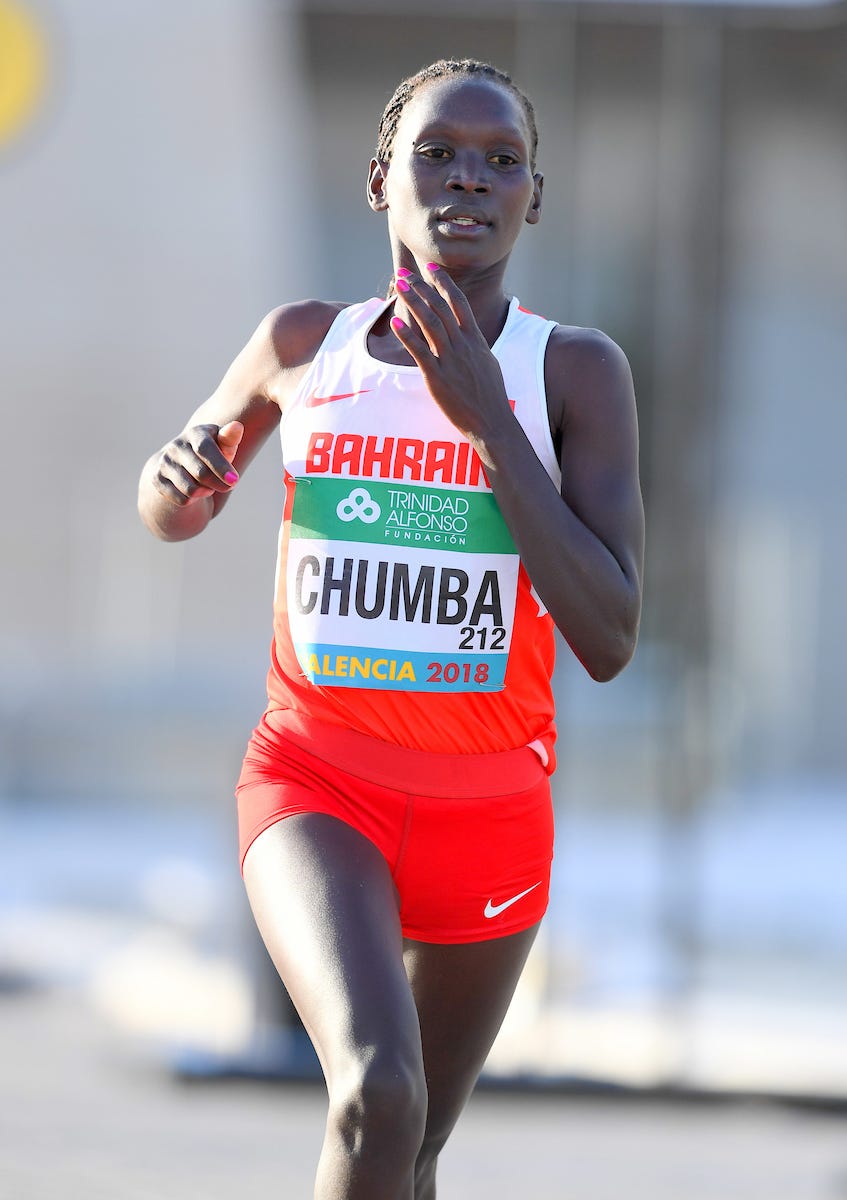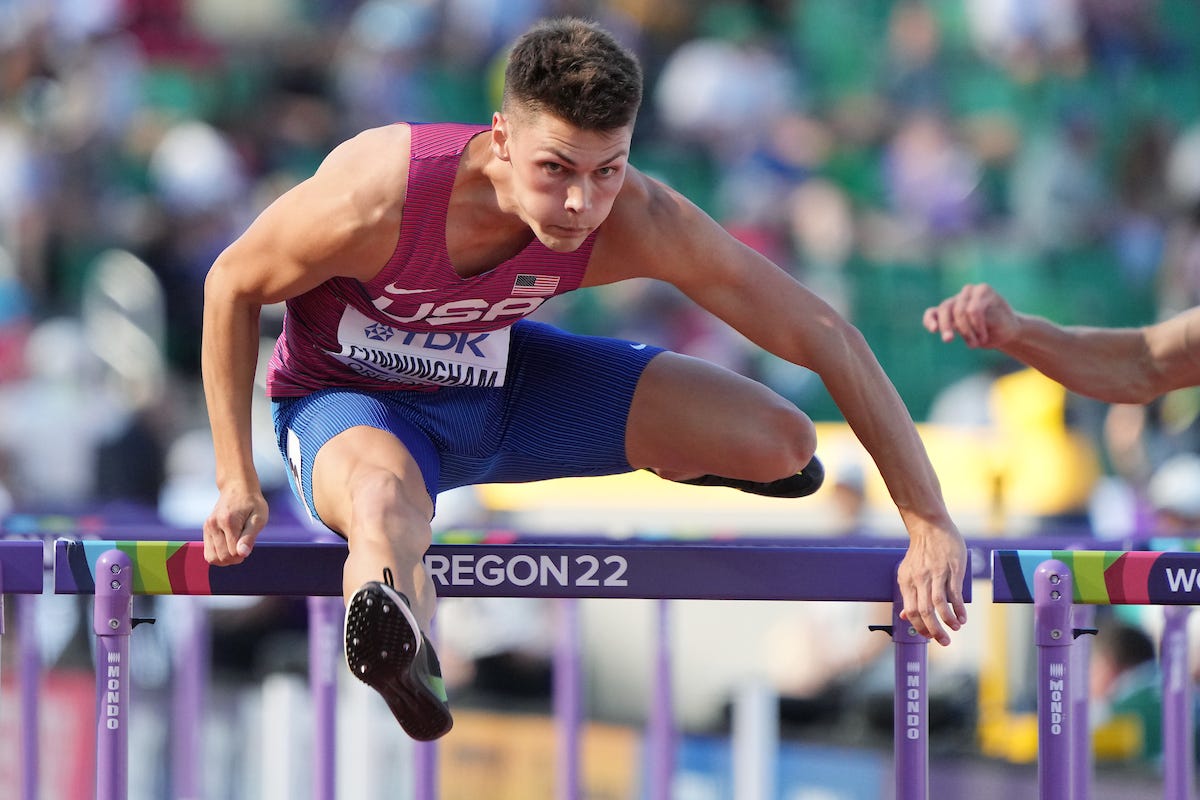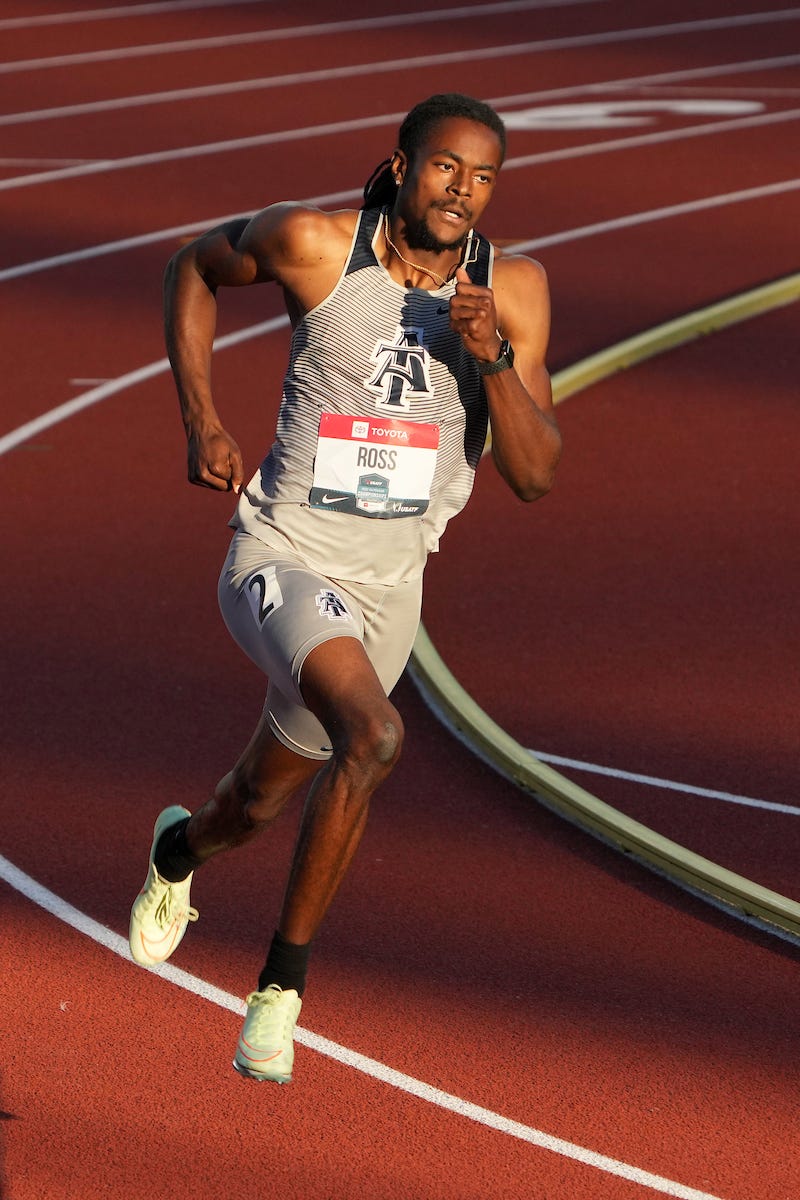Week in Review: From pacesetter to winner
Kiplagat Ronoh wins Abu Dhabi Marathon after fulfilling rabbiting duties

Most elite marathon runners and their coaches go to painstaking lengths planning how they will run the 26-mile, 385-yard race to the best of their abilities. But that was not the case for Timothy Kiplagat Ronoh in the Abu Dhabi Marathon last Saturday.
The Kenyan began the race as a pacesetter for the elite men’s field, but he ended it as the runaway winner after crossing the finish line in a personal best of 2 hours 5 minutes 20 seconds.
Pacesetters are usually given detailed instructions before a race about what splits they should hit at certain points on the course in order to give the elite runners in the field the best chance of running as fast as possible. They are not expected to finish races after bringing the lead pack of competitors through a certain point on a course, such as the 25- or 30-kilometer mark.
Once their pacesetting work is done, they almost always pull off the course. But Ronoh chose not to do that in Abu Dhabi.
Running in his third marathon of the year and his first since setting a course record of 2:09:12 in Melbourne on Oct. 2, he led the field through the first 10 kilometers in 29:33 before clocking 59:31 at 20 kilometers and 1:02:48 at the halfway point. He had a lead of more than a minute when he came through 30 kilometers in 1:28:59 and he continued to pull away from everyone as he passed 40 kilometers in 1:58:40.
Wearing a bib that read PACE M2, Ronoh crossed the finish line with a time that lowered his previous best of 2:07:01 that he ran in finishing third in Eindhoven, the Netherlands last year.
Felix Kimutai of Kenya placed second in 2:09:32, followed by Adeledelew Mamo of Ethiopia in 2:09:42.
“This is my first time in Abu Dhabi, so to win the race on my debut makes it extra special,” Ronoh said in a post on the World Athletics site. “Everything just felt great, we’ve been looked after, the course was really good, and the place is really beautiful. This is a great victory for me.”
Eunice Chehichii Chumba of Bahrain won the women’s race in 2:20:41, followed by Angela Tanui of Kenya in 2:21:12 and Mare Dibaba of Ethiopia in 2:21:25.
Chumba, Tanui, and Dibaba were part of a lead pack that passed through 10 kilometers in 33:11, 20 kilometers in 1:06:36, and the halfway point in 1:10:15.
The lead group was down to that trio when they came through 30 kilometers in 1:39:43 and 35 kilometers in 1:56:34. But Chumba broke open the race during the next five kilometers as she had a 14-second lead on Tanui and a 34-second advantage on Dibaba when she came through 40 kilometers in 2:13:15.
It was Chumba’s first victory in Abu Dhabi as she had finished second in the race in 2018 and last year, and fourth in 2019.
“I’m so happy for this wonderful day. I really wanted to try my best to win this race,” Chumba said. “Last year I was second, today I am the winner. This is my first time to taste victory in this event, on my fourth attempt.
“The course was very good, flat and fast. The weather was great, the fans were wonderful. I’m happy I could win for them.”
A coming trend?: Ronoh is the second runner in the last two months who has begun a race as a pacesetter for the elite men’s field and then placed among the top two finishers.
Samuel Mailu of Kenya finished second in the Frankfort Marathon in Germany on Oct. 30 after leading the lead pack of runners through the 25-kilometer mark in 1:14:27. He then brought eventual winner Brimin Misoi of Kenya through 30 kilometers in 1:28:44 before falling back of Misoi in the next couple of kilometers.
Misoi won the race in 2:06:11, but instead of dropping out as expected, Mailu continued on and finished second in 2:07:19 in what was his debut marathon.
And the winners are . . .: Trey Cunningham and Abby Steiner have been selected as the Bowerman Award winners for 2022.
The award, which began in 2009, is annually given to the best male and female collegiate track and field athlete of the year. Voting for the award was based on an athlete’s performances from December 1 of last year through the conclusion of the NCAA Championships on June 11.
Cunningham, who won a silver medal in the 110-meter high hurdles in the World Athletics Championships in Eugene, Oregon in July, won that event in the NCAA outdoor meet and also placed first in the 60-meter high hurdles in the NCAA indoor meet in March during his senior season at Florida State.
His personal best of 13.00 seconds in the 110 highs ranks second on the all-time collegiate list, as does his best of 7.38 in the 60 highs indoors.
Cunningham also ran the third- and fourth-fastest collegiate times in history in the 60 highs, as well as a pair of 7.42 clockings that give him five of the top eight times ever run.
Grant Holloway, winner of the last two World titles in the 110 high hurdles, set collegiate records of 12.98 in the 110 highs and 7.35 in the 60 highs while competing for Florida in 2019.

Cunningham was one of three finalists for the men’s award.
The others were juniors Ayden Owens-Delerme of Arkansas and Randolph Ross, Jr. of North Carolina A&T, who was removed as a finalist a day before the ceremony on Dec. 15 after receiving a three-year suspension from the Athletics Integrity Unit (AIG) for Anti-Doping Violations.
Owens-Delerme set a then-collegiate record of 8,528 points in the decathlon in April before winning the NCAA title in June. He later raised his Puerto Rican record to 8,532 while finishing fourth in the World Championships.
Ross ran 44.13 to win his second consecutive 400 title in the NCAA outdoor meet after clocking 44.62 to win his first indoor title in March.
You can read more about his suspension in a later note in this column.
Steiner, who turned professional in July by signing a contract with Puma, was selected as the women’s winner of the Bowerman Award after her superb junior year at Kentucky. She set an American record of 22.09 in the women’s 200 and a collegiate record of 35.80 in the 300 during the indoor season before setting a collegiate record of 21.80 in the 200 in the NCAA outdoor meet.
She led Kentucky to third-place team finishes in both the indoor and outdoor championships.
In addition to winning her second consecutive title in the 200 in the indoor meet, she placed second in the 60 and ran a leg on the third-place 1,600 relay team.
In the outdoor meet, she won the 200 and placed third in the 100, and also ran legs on Kentucky teams that won the 1,600 relay and placed second in the 400 relay.
Steiner followed up her collegiate season by winning the 200 in a career best of 21.77 in the USA Track & Field Outdoor Championships, placing fifth in the event in the World Championships, and running the second legs on U.S. teams that won gold medals in the 400 and 1,600 relays in Eugene.
She reacted on Instagram: “2022 Bowerman winner! An amazing way to cap off the season of my dreams. All I can say is thank you. What a special night surrounded by some amazing people. ❤️”
Senior Camryn Rogers of UC Berkeley and sophomore Anna Hall of Florida were the other women’s finalists.
Rogers raised her Canadian national record in the hammer throw to 77.67 (254-10) in winning her third title in the NCAA Championships. It was the third collegiate record of the season for Rogers, who won the silver medal in the World Championships.
Hall won the heptathlon and pentathlon in the NCAA outdoor and indoor meets, respectively, while helping Florida win team titles in each competition.
She also placed second in the 400 hurdles in the NCAA meet after previously moving to second on the all-time collegiate list in the heptathlon when she totaled 6,458 points to win the USA Track & Field Combined Events Championships in early May.
She had her best performance of the season in the World Championships when she won the bronze medal with a score of 6,755 points to move to third on the all-time U.S. performer list.
National rankings time: Newbury Park High School in California, paced by Nike Cross Nationals winner Aaron Sahlman, has three of the top-10 ranked boys’ cross-country runners in the nation in dyestat.com’s final rankings.
Sahlman, a senior, was top-ranked Newbury Park’s No. 3 runner this season before winning the Cross Nationals title on Dec. 3 to earn a No. 1 national ranking. Senior twin teammates Leo and Lex Young were ranked eighth and 10th.
Lex Young was ranked first and Leo third entering the Cross Nationals race in Portland, Oregon, but they had uncharacteristic subpar races in that meet and finished 35th and 11th, respectively.
Newbury Park was so dominant this season that senior Brayden Seymour, the Panthers’ No. 4 runner for most of the season, was 41st in the final rankings after finishing 24th in the Cross Nationals race.
Senior Kole Mathison of Carmel High in Indiana, was the No. 2-ranked boy nationally after finishing fourth in the Cross Nationals race and winning the Champs Sports Cross Country National Championships title in San Diego the following week.
Junior Daniel Simmons of American Fork High in Utah was ranked third after finishing second in the Cross Nationals race.
Sophomore Sadie Engelhardt of Ventura, who was 19th, and junior Payton Godsey of Oaks Christian in Westlake Village, who was 21st, were the two Southern Section standouts ranked among the top 50 girls’ runners by dyestat.com.
Englehardt placed 10th in the Champs Sports Cross Country National Championships after winning the West Regional and the Division II race of the California Interscholastic Federation (CIF) State Championships.
Godsey won the gold race of the Garmin RunningLane Championships in Huntsville, Alabama on Dec. 3 after winning the Division IV title in the CIF meet.
Irene Riggs of Morgantown, West Virginia was ranked first after she capped an undefeated season by winning the Cross Nationals title by nearly 14 seconds.
Fellow senior Karrie Baloga of Cornwall Central High in New Windsor, New York was ranked second after winning the Champs Sports title and finishing second in the Northeast Regional meet.
Junior Ellie Shea of the Emerging Elites club in Waltham, Massachusetts was ranked third after finishing second in the Champs Sports meet and winning the Northeast Regional.
The latest news from the AIU: As written previously, Randolph Ross, Jr. of the U.S. has been suspended from competition for three years by the Athletics Integrity Unit (AIU).
Ross, who has won the past two NCAA titles in the men’s 400 meters for North Carolina A&T, had his suspension retroactively dated to July 1 of this year, and all his competitive results from June 18 onward, which includes his participation in the USA Track & Field Outdoor Championships, have been disqualified.
The 21-year-old, who ran a personal best of 43.85 seconds in winning the NCAA title last year, has never tested positive for performance enhancing drugs. However, he committed an anti-drug rules violation when he was unavailable for three unannounced drug tests during a 12-month period that ended with his third missed test on June 18 of this year.
A December 13 press release from the AIU also stated that he had “admitted to AIU representatives that he altered a system-generated email (confirming an apparent update to his Whereabouts information for the relevant period) to try to avoid a third Whereabouts Failure within a 12-month time span.”
The two violations can lead to a suspension of up to four years, but the AIU reduced the penalty by a year because of “Ross’ prompt admission” of the rules violations, which had led to him being provisionally suspended just before he was scheduled to run in a first-round heat of the 400 in the World Championships on July 17.
Ross’ suspension means he will be ineligible to compete in qualifying meets for U.S. teams that will compete in the World Championships in Budapest, Hungary next summer and in the 2024 Olympic Games in Paris.
Assuming he is in racing shape, there is a chance Ross will get an opportunity to qualify for the U.S. team that will compete in the 2025 World Championships in Tokyo because that meet is scheduled to be held from Sept. 13-21. That year’s USA Track & Field Outdoor Championships – the U.S. qualifying meet for the Worlds – is not expected to be held until sometime in July, after Ross’ suspension has ended.

The latest news from the AIU II: Aras Kaya of Turkey has been suspended from competition for three years by the Athletics Integrity Unit (AIU) for testing positive for the banned substance erythropoietin (EPO).
The violation typically carries a four-year ban, but Kaya’s penalty was reduced by a year because he “returned a signed admission” to the AIU on the day he was informed of his positive test for EPO, which increases the oxygen-carrying ability of blood.
His suspension began on Dec. 4 and all of his performances since Sept. 25 – the day he gave the sample that tested positive – have been disqualified.
The Kenyan native, whose birth name was Amos Kibitok, won the senior men’s title in the European Cross Country Championships in 2016 and ’19, and helped Turkey win team titles in 2017 and ’18 when he placed seventh and third, respectively, as an individual. He also placed second to Jakob Ingebrigtsen of Norway in last year’s meet.
Better late than never: Much to my chagrin, I forgot to mention last week that Sports Illustrated has selected Allyson Felix as the recipient of its Muhamad Ali Legacy Award for 2022.
The award celebrates an individual whose dedication to the ideas of sportsmanship has spanned decades and whose career in athletics has impacted the world.
The 37-year-old Felix ran the final race of her illustrious career on July 23 when she ran the second leg on a U.S. 1,600 relay team that won its qualifying heat in the World Championships on July 23.
Felix was a five-time Olympian and a member of 10 U.S. World Championship teams. She won 11 Olympic medals – the second most in track and field history – and an unprecedented 20 medals in the World Championships.
Felix first began her transition from strictly an athlete to using her platform for social good after her daughter Camryn was born two months prematurely and spent a month in the neonatal intensive care unit before going home with Felix and her husband Kenneth Ferguson.
When Felix’s pregnancy led Nike to offer her a drastically reduced shoe contract, she switched ties to become apparel company Athleta’s first sponsored athlete in July of 2019.
Last year Felix and her brother Wes, who is also her agent, formed a footwear and lifestyle company called Saysh, which designs shoes by and for women. She wore a pair of Saysh-designed spikes while winning a bronze medal in the 400 and a gold medal in the 1,600 relay in the Olympic Games in Tokyo.
In addition to her success in the business world, Felix emerged as a powerful advocate for several social issues, including improving access to prenatal care for African American women, whose rate of death during childbirth is roughly three times higher than white women.
In a recent Instagram post, Felix described her evolution toward using her platform to elevate important ideals: “When I first started running, I had no idea why I ran. I knew I wanted medals and wanted to win, but I didn't know why. I finally understand why I ran – it's to try to make the world better for my daughter and every other woman on this planet.”
On a personal note: I expect this to be my last Substack post of the year, as my wife Brenda and I are scheduled to move next week and I need to turn my full attention to the myriad of things associated with moving.
However, you should be on the look-out for a January 1 post about my top 10 men’s athletes of the year for 2022 and a January 2 post about my top 10 women’s athletes of the year.
I hope everyone is in the midst of a wonderful and relaxing holiday season.




Happy Holidays to you and your family, John. I've thoroughly enjoyed reading your newsletter, and best of luck with the move!